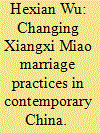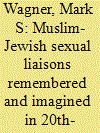|
|
|
Sort Order |
|
|
|
Items / Page
|
|
|
|
|
|
|
| Srl | Item |
| 1 |
ID:
117934


|
|
|
|
|
| Publication |
2013.
|
| Summary/Abstract |
This essay describes elements of Xiangxi Miao marriage practices such as courtship, wedding ceremonies, and marriages between the Miao and Han, exploring how Xiangxi Miao marriage practices changed at the turn of this century, and disclosing social influences on the changes in marriage practices. The author uses a Miao village of Zalun as a case study. Through participant observation and intensive interviews, it was found that, before 2000, Xiangxi Miaos' courtship practices and wedding ceremonies had strict processes and reflected agricultural rhythm. In addition, there were few marriages between the Miao and Han. Since the beginning of this century, Xiangxi Miao marriage practices have changed due to socioeconomic development, population mobility, and diverse communication between Miao young women and men. Dramatic shifts in marriage practices have produced social influences among Xiangxi Miao communities. The changes in marriage practices have promoted Xiangxi Miao free marriages, advancing social cohesion and acculturation. However, these changes have also increased numbers of criminals and problems of healthy growth and education of the stay-at-home children.
|
|
|
|
|
|
|
|
|
|
|
|
|
|
|
|
| 2 |
ID:
178034


|
|
|
|
|
| Summary/Abstract |
Despite mutual taboos against exogamy, memoirs and similar materials written by Jews from Yemen contain a number of anecdotes describing love affairs and sexual encounters between Muslims and Jews prior to the mass migration of the vast majority of Yemen's Jews to Israel in 1949–50. These stories associate these liaisons with vulnerability, poverty, and marginalization. In them, sex and conversion to Islam are intrinsically connected, yet this interreligious intimacy leads not to resolution but to ongoing identity crises that persist beyond the community's realignment with a majority-Jewish society. The staging of the anecdotes in rural areas where shariʿa norms held only nominal sway, in watering places and hostels where strangers might interact, and at dusk, when identity is difficult to discern, heightened their ambiguity.
|
|
|
|
|
|
|
|
|
|
|
|
|
|
|
|
| 3 |
ID:
150562


|
|
|
|
|
| Summary/Abstract |
This article addresses the question of whether a shift to a self-chosen marriage partner means that traditional cultural norms stressing family influence on spouse selection have been weakened by inroads of modern norms of greater individual autonomy in the marriage process. Using a representative sample of 1552 married young adults (aged 20–34) in Greater Jakarta, we explore the courtship processes and the degree of parental role involved in spouse selection. Although only 4% of the respondents cited that their marriage was arranged by others, over half of the respondents reported their parents or in-laws played a major role in their marriage decision. Our multivariate analysis suggests that tertiary educated respondents are those most likely to report their parents playing a major role. We reflect on the prevailing cultural norms to discuss the centrality of family in studying the interactions between marriage, education, and social mobility in modern Indonesia.
|
|
|
|
|
|
|
|
|
|
|
|
|
|
|
|
|
|
|
|
|